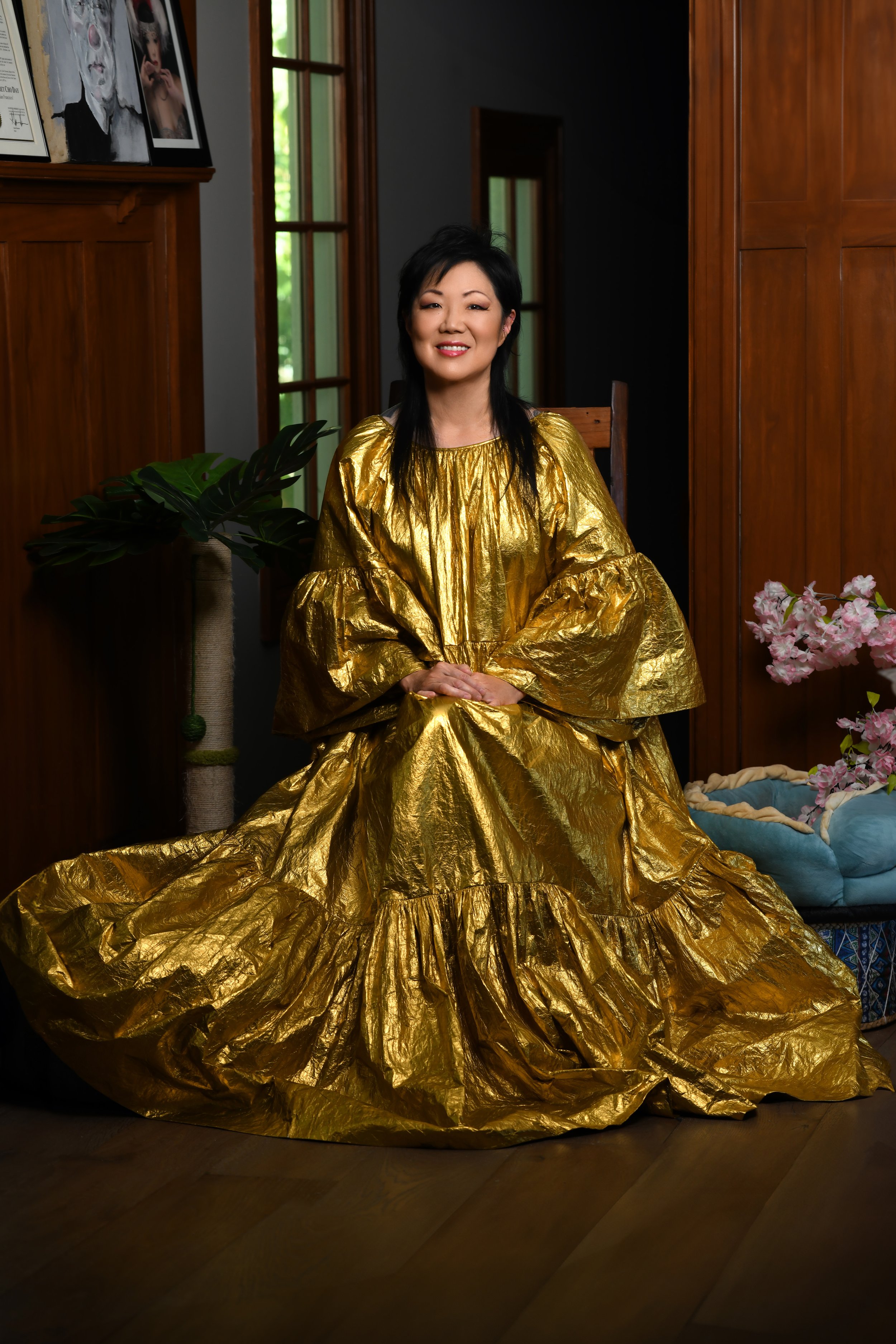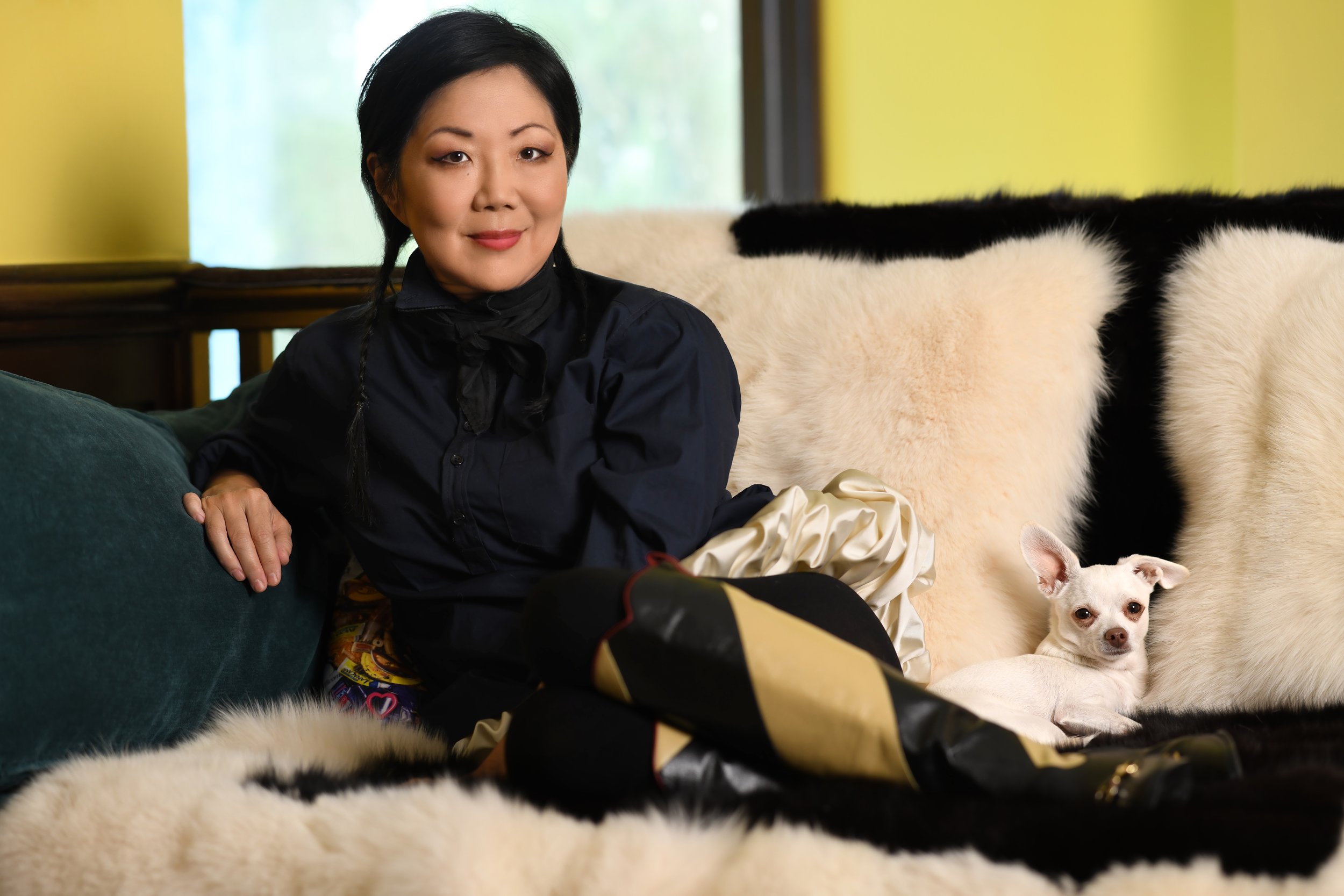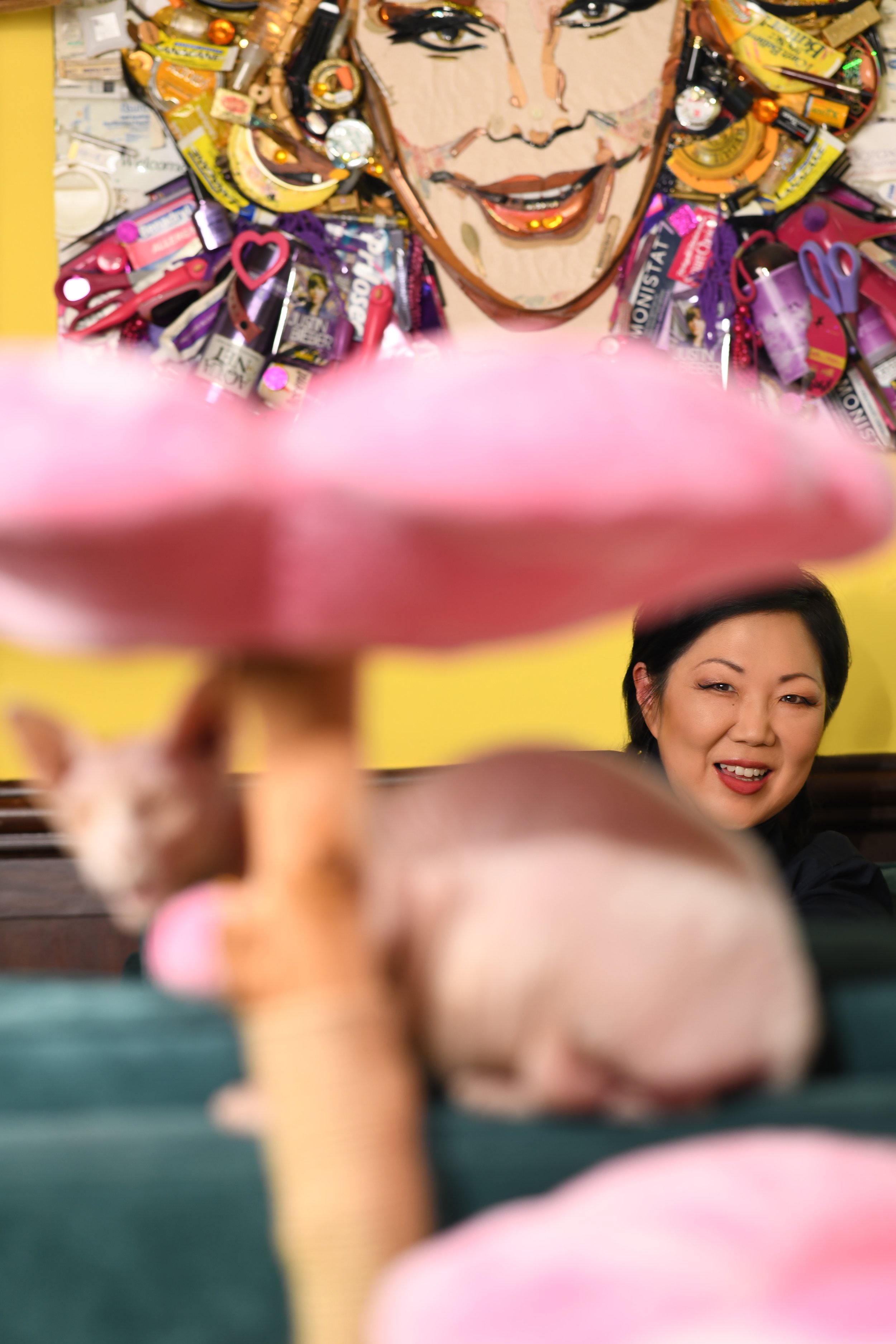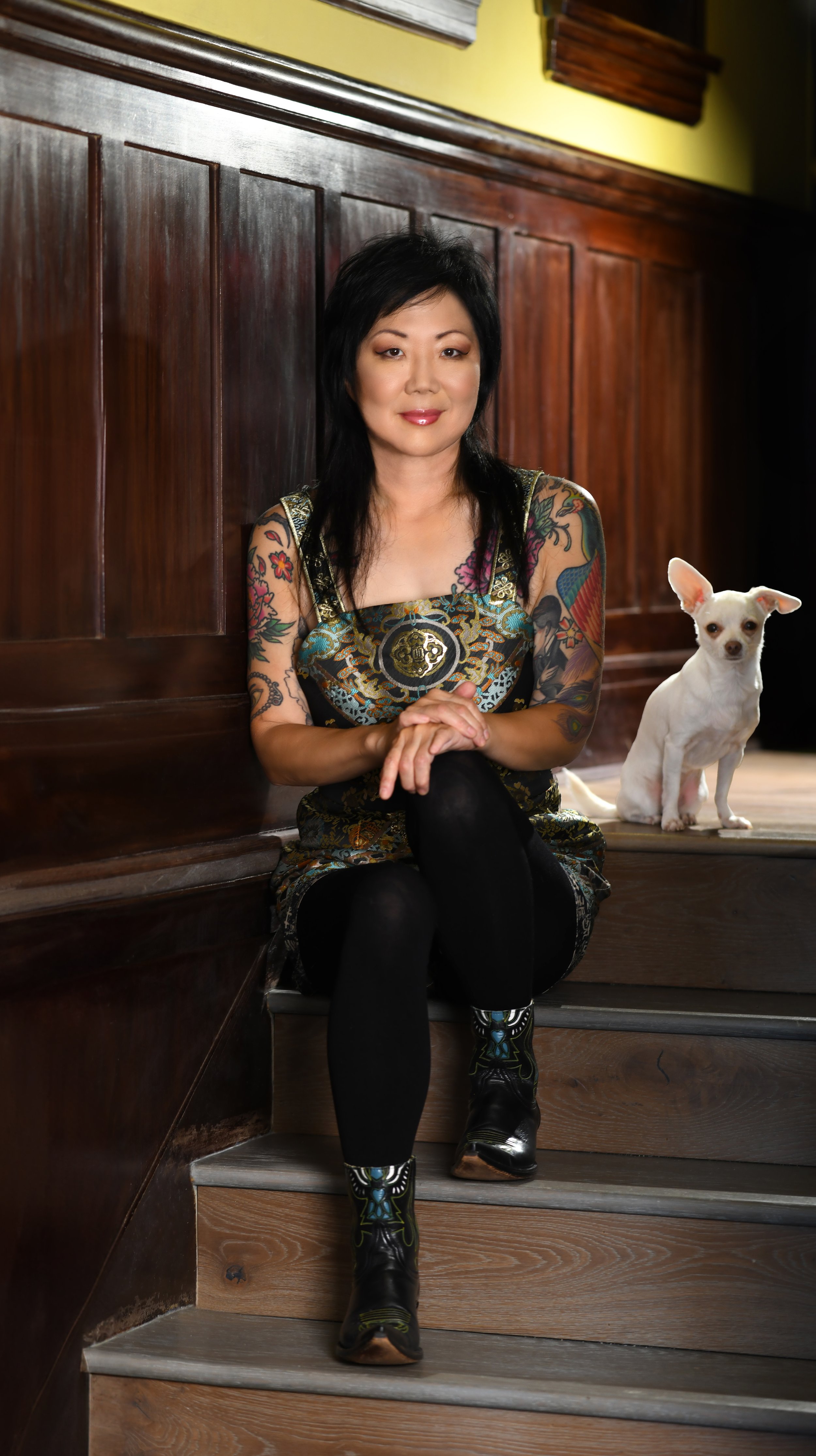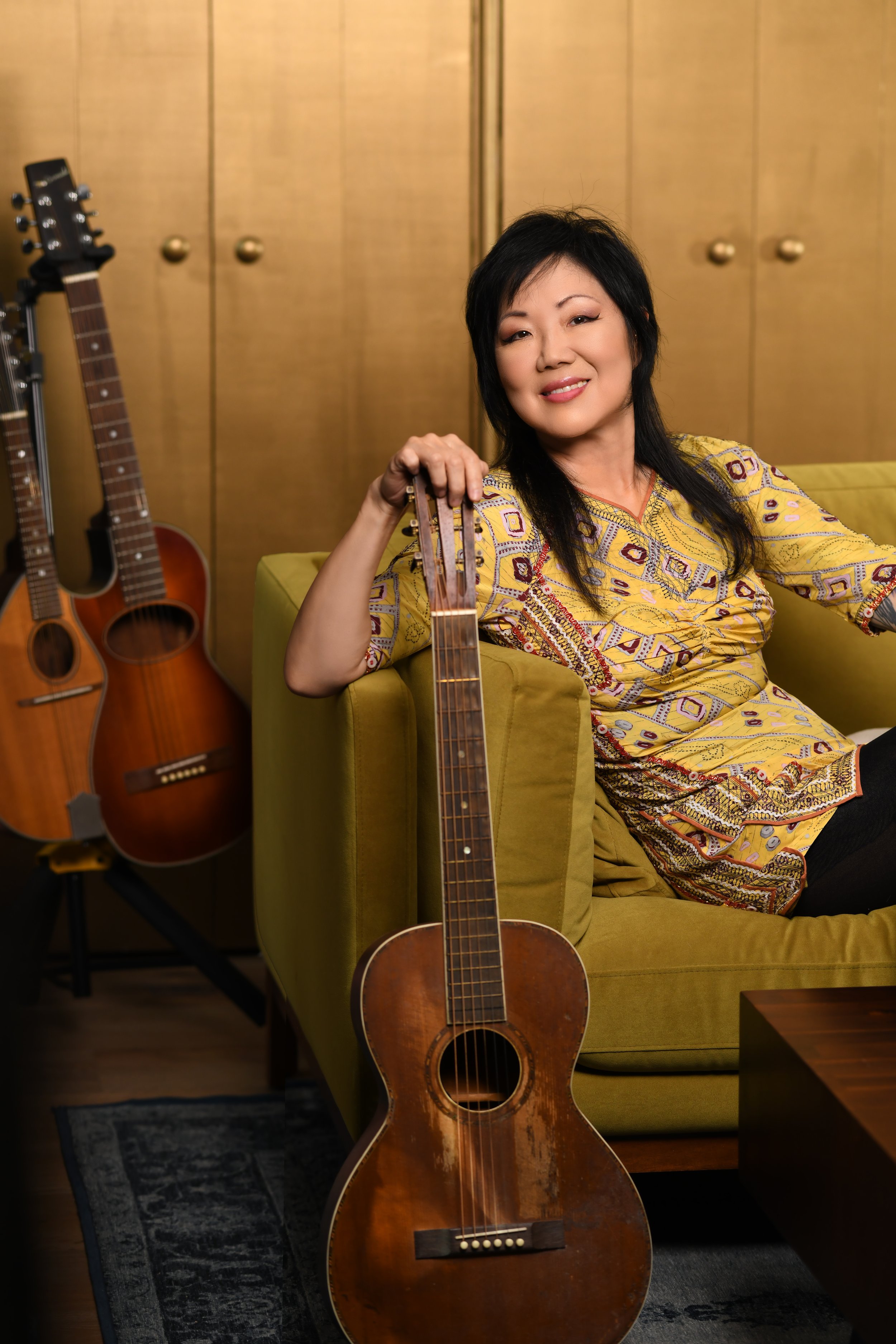MARGARET
CHO
BREAKING
DOWN WALLS
THROUGH ROARS OF LAUGHTER
Written by Alan Uphold
Photographs by Paul Robinson
Critically acclaimed Los Angeles photographer, Paul Robinson, has created a 12-part series of photos and articles featuring twelve LGBTQ individuals who have used their notoriety, their celebrity, or their downright chutzbah to affect change in the LGBTQ community.
The series, named “Twelve Soldiers,” will feature Paul’s photographs and a profile of a different social justice warrior each month.
In addition to Paul’s incredible photos of the twelve featured soldiers, his company, NEFT Vodka will donate $1,000 to the charity of choice for each of the featured soldiers.
Margaret Cho has undeniably changed people’s perceptions about the LGBTQ community in ways that are simultaneously audacious and surreptitious.
Cho has been recognized as one of the most influential comic voices in American history.
Rolling Stone named her one of the 50 Best Stand-Up Comics of All Time, Vogue named her one of the Top 9 Female Comedians of All Time, and CNN chose her as one of the 50 People Who Changed American Comedy.
To be recognized as someone who has changed American comedy is an unbelievable distinction, but Cho has changed so much more.
When most people think of attitudes toward the LGBTQ community in Asian cultures—and more specifically in Korean culture—phrases like, “unconditional acceptance” and “unqualified tolerance” may not be among those that immediately come to mind.
But Margaret Cho has helped to change all that.
Through her stand-up comedy, her Emmy-nominated acting performances, her five Grammy-nominated comedy albums, her music, her books, and well, pretty much ALL of her artistic endeavors, Cho has been instrumental in changing attitudes about both Asian-Americans and LGBTQ people.
Margaret’s introduction to the LGBTQ community began when she was a young girl working at her father’s bookstore in the heart of one of San Francisco’s gayest neighborhoods, the Polk district.
“I grew up around gay men who were my nannies, and my baby sitters, and my caretakers,” she recalls.
...unfortunately, many of those people who had such an influence
on me as a teenage girl were lost during the AIDS pandemic.”
They were very artsy men, some of whom had full body tattoos and others that were doing drag. Some were macho guys like the Marlboro Man, some wore feather boas, some wore leather, but all of them were in some form of costume. Even the lesbians wore costumes—like erudite professors with patches on their corduroy jackets.”
Cho remembers being surrounded by this illustrious cast of characters with great fondness saying, “I was around all of these amazing people all the time from the age of seven.”
She excitedly recalls, “Armistead Maupin (author of the popular series, Tales of the City) would actually come into our bookstore to do book signings!”
She continues with a sense of melancholy, “But a lot of my first real friends were older gay men, and, unfortunately, many of those people who had such an influence on me as a teenage girl were lost during the AIDS pandemic.”
It’s no surprise, then, that from the moment she started publicly performing comedy at the age of 14, Cho never shied away from talking about her early connections to the LGBTQ community.
“To live through that devastation of the AIDS pandemic and witness the collapse of such a vibrant community really affected me. It burned in my soul, and I really wanted to keep this culture alive and tell people about it.”
Perhaps that is why, from her earliest days in comedy, the LGBTQ community embraced her.
Unfortunately, Margaret’s path from being a self-described awkward daughter of Korean immigrant parents to becoming an early LGBTQ advocate, and
one of the most celebrated comedians of all time, was not without disappointment, pain, and betrayal.
In her critically acclaimed one-woman show, I’m The One That I Want (which later become a best-selling book and movie), Cho talks openly about her childhood.
In it, she describes how, as an innocent and naïve young girl, she befriended a group of white girls from her school who, for reasons unclear to Margaret, eventually turned against her and went on to became her most hurtful tormentors.
In a perverse sort of way, Margaret believes that those early experiences of betrayal and bullying helped to prepare her for the internet era.
“All of us who were young and queer and who were bullied as kids are really good on the internet now,” she says. “It oddly prepared us for social media and all of the trolls and haters who came after us.”
“Kids sense when somebody is different, and I remember how they tended to bully those of us who were artistic, unique, or what I like to call ‘nerd-divergent.’”
Even though Cho has managed to put those elementary school days behind her, like most celebrities, she is constantly subjected to cyberbullying and online trolling.
Much like her experiences of being bullying as a child, being bullied on the internet has only strengthened her resolve and has given her more material from which to draw her comedy.
“Comedy and jokes come from a place of pain because a lot of the time you are coping with loneliness or
ostracization. I think people use humor as a defense mechanism and a way to cope, but it also provides a sense of hope and survival,” she says.
“If you can find the dimmest glimmer of hope in a situation, it gives you this survival instinct. It gives you a certain level of mental health. If you can joke about things, you can deal with those things. And it ultimately gives you hope.”
After ten years of using her comedy as both a sense of hope and a sense of belonging, Margaret’s comedic ascendency came to a climax when she won the award for Best Female Comedian at the 1994 American Comedy Awards.
It was that same year that ABC television network offered Cho the opportunity to star in her own prime-time comedy sitcom—an opportunity that she describes in I’m the One That I Want as “the thing that every comic dreams of.”
Unfortunately, her experience on All-American Girl turned out to be less of a dream and more of a nightmare.
The network had told Margaret that they wanted to do a show with her because they wanted to showcase her edgy, liberal comedic portrayal of the “typical Asian-American immigrant experience.”
What they really wanted was a watered down, milquetoast trope that they believed would “appeal to a broader audience.”
Perhaps even more devastating to Margaret—who was supposed to be portraying a version of herself in her own show—came about when she was told that she would need to lose weight.
“I come from an era in which Hollywood was emerging
and evolving about their attitudes towards LGBTQ people”
And in order to help her achieve the appropriate weight, the network ever so helpfully provided her with a trainer, a dietitian…and weight loss drugs.
Despite assurances from the network that they really wanted the show to capture her essence, All-American Girl never really portrayed Cho’s essence or her comedic spirit.
It was cancelled after 19 episodes.
In the years that followed, Margaret struggled with addiction issues and depression as she dealt with feelings of inadequacy and failure.
Even though her experience on the show was traumatic on many levels, and ultimately led to a dark period in her life, Cho looks back on the experience with a different perspective today.
All-American Girl was, after all, groundbreaking and historic as the first primetime network show about an Asian-American family. Indeed, it would be another 20 years before an Asian-American family would be featured on a major television series.
“Looking back now, I’m really proud of All-American Girl, and I’m really glad that I was able to take what happened to me on that show and write it into my stand-up comedy,” she said.
“Ultimately, the experience made me a much better comedian and made me better able to handle all of the things in the industry that I experienced after that.”
There was another experience that Margaret had on All-American Girl that contributed to her feelings of self-doubt, self-worth, and repression.
She became acutely more aware of the way in which Hollywood dealt with LGBTQ people.
“I come from an era in which Hollywood was emerging and evolving about their attitudes towards LGBTQ people. But during my early years, the entertainment industry was still on the edges of old Hollywood. And old Hollywood was still trying to perpetuate this illusion that, under no circumstances, was there any such thing as an ‘LGBTQ celebrity.’”
She’s right, of course. There have been plenty of books and articles and historical accounts published that reveal how LGBTQ celebrities were threatened and told to keep their private lives a secret. Even openly gay agents and managers and studio executives back then forced their clients to stay in the closet.
Cho said, “I remember being on tour, and Rip Taylor would dramatically burst into my dressing room and throw confetti all over the place with a flamboyant flare. He was such a sweet man, but he never felt comfortable enough to be who he was. People like Rip, and Paul Lynde, and Liberace were so obviously gay, but they weren’t allowed to be out. I always thought it was really sad that the public never got to see these comedic Hollywood icons just being free and being themselves.”
In the early days of Margaret’s career, entertainment executives were still clinging to those absurd vestiges of an imagined Hollywood where no one was LGBTQ.
It deeply affected her own ability to feel free and be herself.
“I remember I had a manager who came backstage at one point and saw me sitting on [openly gay comic] Leah DeLaria’s lap. He came up to me and said, ‘YOU are 100% heterosexual! I don’t care what you do when you’re not here, but in this arena [by which he meant
“I don’t know that using ‘bisexual’ is right
because that indicates that there are only two genders, and I don’t believe that.”
show business], you are 100% heterosexual!’”
Having spent most of her life surrounded by loving and supportive LGBTQ people for so many years, Margaret decided it was time to publicly renounce old Hollywood and come out as bisexual.
She reflected back on that moment during a 2018 interview, saying,, “I don’t know that using ‘bisexual’ is right because that indicates that there are only two genders, and I don’t believe that. I’ve been with people all across the spectrum of genders who have all kinds of different expressions of gender, so it’s so hard to say.”
Perhaps in acknowledgement of her childhood experiences in San Francisco, she continued by saying, “Maybe ‘pansexual’ is technically the more correct term, but I like ‘bisexual’ because it’s feels kind of ‘70s.”
Even before coming out, Cho’s advocacy work in the LGBTQ community was legendary.
She has given her time and talents to virtually every cause she has ever been asked to support.
In 2007, she headlined the True Colors tour including a line-up that featured Cyndi Lauper, Debby Harry, and Rufus Wainwright, among others. The money she helped raise on the tour benefitted the Human Rights Campaign, PFLAG, and the Matthew Shepherd Foundation.
Margaret’s advocacy work for the Asian community, the LGBTQ community, women’s rights groups, and numerous other civil rights movements has brought her a plethora of awards that recognize her tireless efforts for the causes in which she steadfastly believes.
Among the many organizations that have given her awards are Gay & Lesbian Alliance Against Defamation (GLAAD), Lambda Legal, the National Organization for Women (NOW), the American Civil Liberties Union (ACLU), Parents & Friends of Lesbians and Gays (PFLAG), and the list goes on and on.
Having received so many life-affirming acknowledgements from causes and awards that she cares about so deeply, Cho reflected on the ones that have meant the most to her.
“It’s so hard to pick just one of these organizations because they are all doing such incredible work. ACLU was an incredible acknowledgement; anything from GLAAD is amazing; and I really loved working with HRC on The Cindy Lauper True Colors Tour because it was led by these incredible women who all came together to support a message of love and acceptance.”
“One organization that is important to me is the Ali Forney Center, which is a shelter in New York for queer youth that have been cast out of their homes. I grew up in San Francisco in the 70s, so I saw a lot of young people that were rejected by their families and didn’t have any place to go. I’m glad to see the work of Ali Forney supports these young people.”
Another organization, the Friendly House LA is also near and dear to Margaret—especially because of her own personal experiences as a woman with addiction issues. Founded in 1971, Friendly House was the first residential program for women struggling with addiction issues, and all of their funding comes solely from private donations and grants.
Margaret has chosen Friendly House LA as the recipient of her $1,000 donation provided by Neft Vodka.
“I wish I had appreciated myself when I
was younger the way that I do now.”
“More than anything, I love and support the missions of all of these organizations, but I think this shelter is really doing important work.”
On a more personal level, Margaret says that she will continue to add to her well-known tattoo collection by using her body as a canvas for her ink art.
“I just got a new tattoo, and it’s basically blue Chinese porcelain on my leg. I’m excited about all of these new tattoo innovations. It hurts a lot more as you get older, and gravity does eventually catch up with you over time, but it’s still fun for me.”
Margaret also has a new love in her life, and the two of them have been inseparable ever since they first met in 2019. Her chihuahua mix dog, Lucia Katerina Lawlor Cho, rescued Margaret from a shelter, and she has literally been in Margaret’s lap ever since the day they met. Lucia has traveled the world with Margaret and has appeared on many red carpets with her.
Margaret said that when there’s no one else in the world that she feels she can turn to, she knows she can always turn to her best friend, Lucia.
As for her career, Cho is as busy now as she has ever been.
She has appeared in everything from Law & Order SVU to Flight Attendant, to Hacks, to the Oscar-nominated animation film, Over The Moon.
Her universally lauded album, Cho Dependent, featured collaborations with artists Fiona Apple and Tegan & Sarah, among others. It received wide critical acclaim as well as a Grammy nomination in recognition of not only Cho’s comedy expertise but also her musical abilities.
In 2022, Margaret appeared as the sort of mother hen character to a group of young gay men in the movie, Fire Island. It was a character that was practically written for her, and she felt very much at home playing the role.
The film was a huge hit—both financially and critically—and received a People’s Choice Award, GLAAD Media Award, Dorian TV Award and Gotham Award and was nominated for an Emmy.
Ultimately, though, it all goes back to where it all started for Margaret…stand-up comedy.
“I’m still doing stand-up comedy, and it’s a thing that I will always do. It’s my real passion and love, and it’s a continual source of enjoyment and excitement for me,” she says.
When you consider the journey of an intrepid woman who is as accomplished and as celebrated as Margaret Cho, it’s hard to imagine that she could ever have been an awkward little Korean girl who would look in the mirror and wish that she looked like somebody else.
Maybe that’s why she feels that it’s important for her to project a positive and affirming message for any young person out there who might feel different, or weird, or nerdy, or awkward, or “something other.”
“I wish I had appreciated myself when I was younger the way that I do now. But I didn’t know how to. There were so few images of Asians in society back then.”
“When I was growing up, there were no people that looked like me on TV or in the movies, or quite frankly, anywhere in the media. Today, I really appreciate who I am, and I enjoy who I am.”
“I have a good time with myself now.I don’t have any issues with what I look like anymore. And being able to appreciate that is a good thing.”


